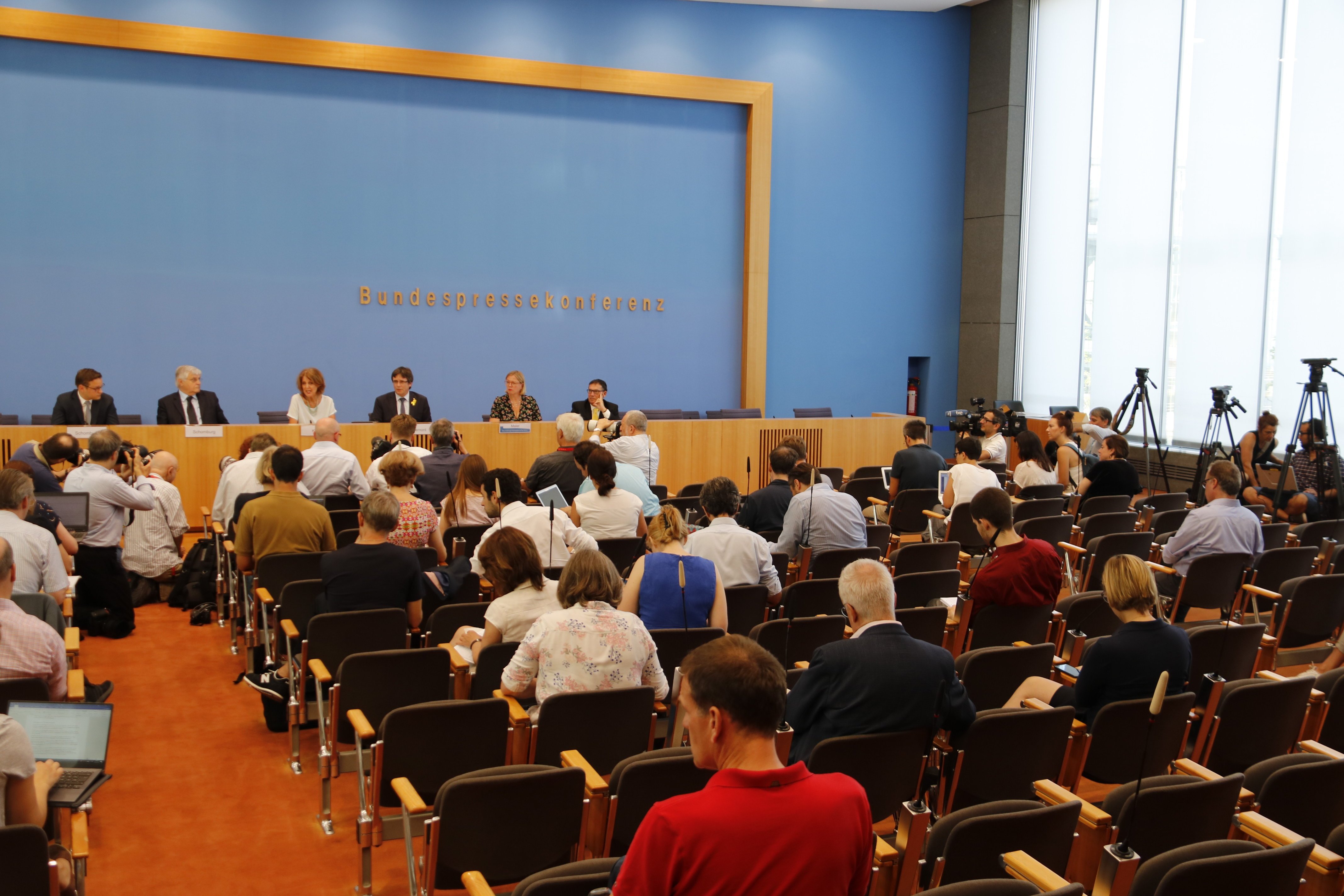Catalan president in exile, Carles Puigdemont, has given one final press conference in Berlin as his four months in Germany come to a close. He took the opportunity to tell Spanish prime minister Pedro Sánchez that the return of the prisoners and exiles "shouldn't be seen as a problem, but as the start of the solution".
"We've always said that everything to do with returning to the normality interrupted by [article] 155 forms part of the solution, not the problem", said the president, referring to the article of the Spanish Constitution used by the central government to suspend Catalan autonomy last year.
During the press conference, held at the Haus der Bundespresekonferenz, the headquarters of the Berlin press corps which hosts the regular government press conferences, before German and international media, Puigdemont admitted the new PSOE executive has brought a time of "climate change", but that "the time of deeds hasn't arrived", "we're waiting for the time of deeds".
Referendum
The conference was full of messages to the Spanish government, including that a Catalan vote fits within an open reading of the Spanish Constitution. "The question we have to ask ourselves is: the Spanish government, how far is it prepared to go within the confines of the Constitution to resolve the Catalan question?" He stated there is no precept in the Constitution which would prohibit a referendum and noted that the Spanish state recognises international legislation on the issue.
Puigdemont is calling for a negotiated referendum, like the 2014 vote in Scotland, as a priority. "We will never say 'no' to a referendum", he said, but he also defended last year's vote: "the referendum, I've already organised it and I'm here for having organised [one]". According to the president, if they'd been able to count the "votes seized by the police", the 1st October last year would have seen more than 3 million votes cast.
Spanish project for Catalonia
The president expressed regret that the numerous attempts by Catalonia over the last few years to find a better fit within Spain didn't manage to make any headway. "Is there a Spanish project for Catalonia? I don't know".
"If the only argument to remain within Spain is force and violence, it's a very poor, weak argument in the 21st century in free Europe," he said.
The president went further, however. He said they will always be open to dialogue with the Spanish state: "We've found it strange that the Spanish state has met in the past with the terrorist group ETA and cannot do so with pro-independence democrats who have never used violence". He also warned that the Catalan issue is no longer just an internal matter and cannot be resolved internally, it requires a European outlook.
Fascist attacks
"The almost religious idea of the unity of the homeland is very little democratic," warned the president. He used the conference to denounce the fascist attitudes of some who try to intimidate peaceful people who defend independence. "The radical acts we're seeing are precisely unionist violence by the far right. Every day there are threats towards people wearing the yellow loop," he said.
Puigdemont said that, in Brussels, he will continue the work he had planned before being arrested in Neumünster to set up the Council for the Republic. He said that he had met with members of four German political parties and has different invitations from around the country and around Europe and that his intention is to continue responding to such invitations. Among his plans, he also mentioned the Crida per la República ("The Call for the Republic"), his new political movement, which he says already has more members than all the pro-independence parties put together.
The president, who appeared alongside his lawyers, attributed his decision to leave Spain to a wish to find independence justice. "Whatever the decision was [from the international court], we knew that it would be marked by professionalism and not by political interference," he said.
He also joked about Pablo Llarena, the judge in Spain leading the case against him and his colleagues. He said that the same judge who wants to suspend him as a parliamentary deputy has withdrawn the European Arrest Warrant against him at the same time as letting him vote through a substitute and deciding that those in prison or exile cannot receive their salaries from the Parliament. "If this judge acting as a judge has built up such a quantity of contradictions, imagine what he could case doing politics".
"What will you take from Germany," a journalist asked him. "I'll take my family, who arrived a few days ago, all the things I've amassed [here], thousands of letters expressing support from around the world, many thanks to people who wanted to help and collaborate, and, above all, I'll take four months which have marked my life and which will have made us all stronger, more resilient and also more determined".

